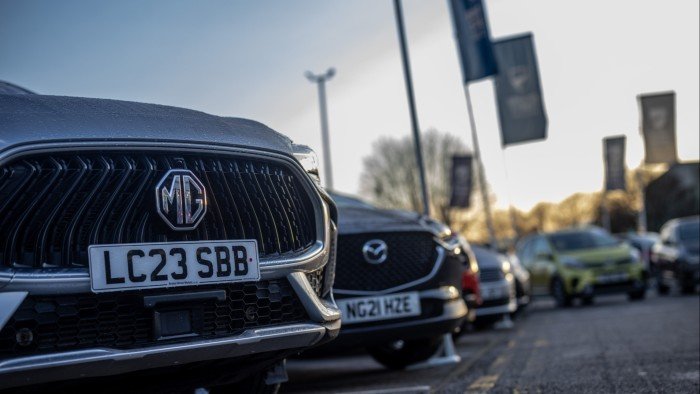Stay informed with free updates
Simply sign up to the UK financial regulation myFT Digest — delivered directly to your inbox.
Shares in British banks surged on Monday after a UK Supreme Court ruling that removed the risk of the industry having to pay tens of billions of pounds in compensation for a probe into motor finance.
Specialist UK bank Close Brothers rose 22 per cent in early trading, while Lloyds Banking Group shares were up 6.5 per cent. Shares in Bank of Ireland, which has a UK car finance business, rose 4.2 per cent. Barclays shares rallied by nearly 2 per cent.
On Friday, the Supreme Court ruled that car dealers did not owe a “fiduciary duty” to their customers, reversing a central part of a Court of Appeal judgment last year that sent shockwaves through the UK banking sector and would have saddled the industry with redress payments that analysts had estimated could reach £44bn.
However, banks are still likely to be on the hook for compensation payouts for the scandal. The Financial Conduct Authority said on Sunday it was planning to launch an industry-wide redress scheme that would cost lenders between £9bn and £18bn.
Simon Ainsworth from credit rating agency Moody’s said the FCA’s proposed redress scheme was “credit negative for UK banks and other consumer credit providers” due to its indication of “substantial compensation payouts for lenders”.
He added: “To date, these lenders have recognised approximately £2bn, in aggregate, in provisions for motor finance commissions.”
Lloyds said on Monday that it would keep a £1.2bn provision that it had set aside to cover the costs of the scandal under review, but added that it “currently believes that if there is any change to the provision it is unlikely to be material in the context of the group”.
Jonathan Pierce, banking analyst at Jefferies, said the FCA’s prediction was “consistent with our estimates, and most importantly, we think it largely de-risks Lloyds’ shares from the ‘motor issue’”.
Some analysts had estimated the cost facing the industry to be as much as £44bn if the court had upheld earlier the decision. The expectation of the large payouts had even seen the Treasury weigh up intervening in the matter, believing that a wider scheme of redress could damage the attractiveness of the UK to investors.
The FCA’s planned scheme is also stirring some criticism from car finance companies, particularly over the watchdog’s proposal to pay compensation to some consumers for car loans going back as far as 2007.
“We have concerns about whether it is possible to have a fair redress scheme that goes back to 2007, when firms have not been required to hold such dated information, and the evidence base will be patchy at best,” said Stephen Haddrill, head of the Finance and Leasing Association. “We will be interested to see how the FCA addresses this point in its consultation.”
The FCA said it would publish detailed proposals of the scheme in October so consumers could start receiving compensation next year.
Its cost projections are well above the sums set aside so far by large banks to cover the scandal, but below previous analysts’ estimates that suggested the figure could match the almost £50bn cost of last decade’s scandal over banks’ mis-selling of payment protection insurance.
The car finance scandal centres on the commissions paid to car dealerships by banks. The court did uphold one Court of Appeal ruling brought by Marcus Johnson, a Welsh factory supervisor.
The court believed that his case stood out because of the scale of the commission he paid for his car and the fact that its terms were embedded in the fine print of a lengthy document. He also was not told that his lender MotoNovo, owned by South Africa’s FirstRand Bank, had the right to refuse the loan in the first place.
Shares in FirstRand, one of Africa’s biggest banks, rose almost 5 per cent to a six-month high on Monday.
